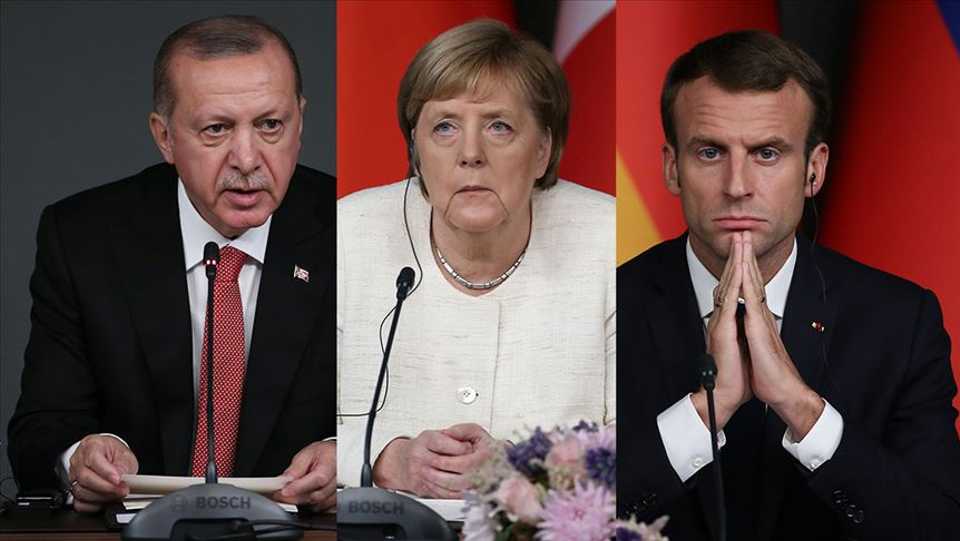
Turkey’s President Recep Tayyip Erdogan said the leaders of Germany and France will visit Istanbul next week for talks on the latest refugee and migrant crisis at Turkey’s border with Europe.
“We will come together in Istanbul next Tuesday” with German Chancellor Angela Merkel and French President Emmanuel Macron, Erdogan told journalists on his plane back from Brussels.
“Turkey has paid a great price for ceasefire and protecting civilians in Idlib, Syria. Now EU must do its part,” he said.
The French presidency did not confirm the summit yet.
Erdogan said it would be a four-party summit if British Prime Minister Boris Johnson joins the talks.
The decision at the end of February to reopen Turkey’s border for refugees seeking to reach Europe sparked a row with Brussels, as well as harsh exchanges with neighbouring Greece.
New migrant deal
Turkey hosts some four million refugees — most of them Syrians — and is demanding greater assistance in dealing with the conflict in Syria and its humanitarian consequences.
So far, Europe has said it will consider taking 1,500 child refugees but has focused more on reinforcing Greece’s borders.
Erdogan sought support from both NATO and the European Union in Brussels on Monday, and despite apparent tensions in his meetings, he sounded upbeat on return.
“We can start a new process with the EU,” he said. “We have taken many steps and will continue to do so.”
He hoped for progress on a new migrant deal with Brussels by the time of the next EU leaders’ summit on March 26.
Turkey agreed in 2016 to prevent migrant departures in exchange for six billion euros in refugee aid and talks on building closer ties.
But Ankara says it has not received all the money, and that other promises — including improved visa and trade rules — have not been fulfilled.
‘Open the doors’
Meanwhile, Erdogan urged Athens to open its doors to refugees.
“This is my proposal to Greece: open the doors. Those people will not stay in Greece permanently and let them cross into other countries in Europe,” he said.
Turkey was prompted to reopen the borders for refugees as it faced a potential new influx from Syria, where regime forces, backed by Russia and Iran, have been pushing to take the last rebel province of Idlib near the Turkish border.
Although Turkey and Russia agreed on a ceasefire for Idlib last week, previous peace deals have proved temporary.
Erdogan said the ceasefire was currently holding.
“It’s has been four days. I hope it will continue like this and turn into a permanent truce.”
The refugee crisis isn’t going away.
The European Union cannot just throw money at this problem or solve it with excessive and lethal force — as Greece attempted to do in recent days.
It’s time take meaningful steps together. #TurKEYforpeace pic.twitter.com/TpR4rTs7P7
— Fahrettin Altun (@fahrettinaltun) March 9, 2020
US in talks with NATO allies
Meanwhile, US is discussing with its NATO allies what they can offer Turkey in terms of military assistance in Idlib and discussing measures that may be taken if Russia and the Syrian regime break a ceasefire, officials said on Tuesday.
“We are looking at what NATO can do,” James Jeffrey, the US special envoy for Syria, told reporters in a conference call from Brussels where he was holding talks with allies.
“Everything is on the table.”
Jeffrey, who was speaking alongside the US ambassador to Turkey David Satterfield, ruled out the use of ground troops should the ceasefire be broken and repeated that Ankara needed to clarify its stance on purchase of the Russian S-400 missiles.










Discussion about this post